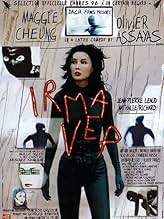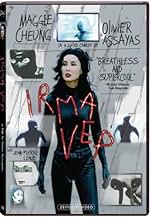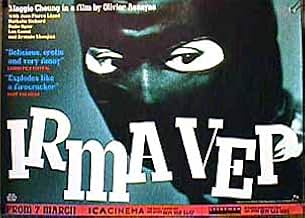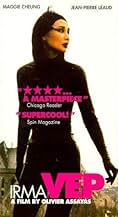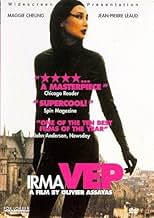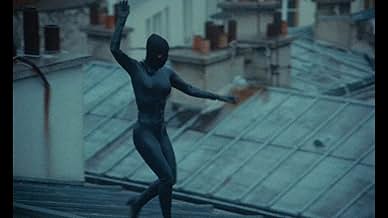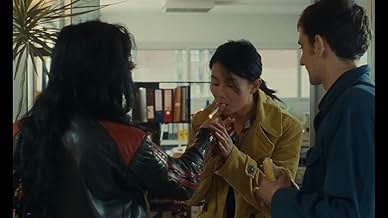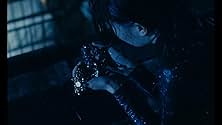Hong Kong starlet Maggie Cheung arrives in France to portray Irma Vep in a remake of Les Vampires (1915), but the production is plagued by behind-the-scenes intrigues.Hong Kong starlet Maggie Cheung arrives in France to portray Irma Vep in a remake of Les Vampires (1915), but the production is plagued by behind-the-scenes intrigues.Hong Kong starlet Maggie Cheung arrives in France to portray Irma Vep in a remake of Les Vampires (1915), but the production is plagued by behind-the-scenes intrigues.
- Awards
- 2 wins & 3 nominations total
- Director
- Writer
- All cast & crew
- Production, box office & more at IMDbPro
Featured reviews
This movie probably means more to the French and French film with its inside French film references. Seemed like it had a cool idea going but it didn't really seem to get going. Characters were not really developed enough. The relationship between the costume maker and Irma Vep character did not get off the ground. When things got interesting the movie was over. I would recommend it but only so as to view French film talking about itself.
French director Jean-Pierre Léaud decides to remake Feuillade's silent serial LES VAMPIRES as a modern feature. He decides to cast Maggie Cheung as Irma Vep based on seeing her in one movie in Marrakesh. When the movie opens, Miss Cheung has just arrived at Léaud's office in the last throes of pre-production, whence she is whisked away to a sex shop to buy a gimp suit to be modified for her costume. After that, things become chaotic, with spoiled takes, spoiled tempers and journalists who lecture her on how to make films.
Miss Cheung is wonderful in the role, a sweet-faced, slightly puzzled woman stranded alone in Paris, trying to perform her part in her first international production, while chaos swirls about her.
There is a lovely, impromptu feel about Olivier Assayas' movie. It feels as if he started out trying to do the remake, and as that became impossible, switched to a different film. That seems unlikely. Undoubtedly that was the look and feel he was trying for. The result is an amusing, slightly tentative effort that makes me wish to look at LES VAMPIRES again.
Miss Cheung is wonderful in the role, a sweet-faced, slightly puzzled woman stranded alone in Paris, trying to perform her part in her first international production, while chaos swirls about her.
There is a lovely, impromptu feel about Olivier Assayas' movie. It feels as if he started out trying to do the remake, and as that became impossible, switched to a different film. That seems unlikely. Undoubtedly that was the look and feel he was trying for. The result is an amusing, slightly tentative effort that makes me wish to look at LES VAMPIRES again.
This is a very solid film, make no mistake, but it tends to play more like a testing ground for various elements of Olivier Assayas' overall style, particularly those which he would later explore more fully in his later masterpiece "Demonlover", than any sort of cohesive narrative statement. It's not very often that a film strikes me as not having enough of a plot, but in the case of this there did seem to be a certain irrelevance to it all. There's nothing really new about the "making a movie" movie, and this doesn't add much to the mix, although i do think it is well done for what it is, and occasionally even approaches a sort of proto-"Lost in Translation", with Paris standing in for Tokyo and Maggie Cheung's Asian "otherness" replacing Bill Murray's fish-out-of-water Americanness. But the film is never really focused enough to compare in any significant way to that film. "Irma Vep" really only comes alive when Assayas gets away from his nagging tendency towards a certain French talkiness and indulges in the moments of pure visual cinema that make up the other half of his general approach (and which seem to be invested with much more enthusiasm here) , such as the scene scored to Sonic Youth's "Tunic" (another foreshadowing of "Demonlover"). Certainly he does have a way with capturing pretty little images of neon lights reflecting through car windows and things like that, enough that I can acknowledge he is definitely a talented filmmaker, but within this film he never quite finds the correct way to integrate his little artistic flourishes into the whole, and overall the film feels more like a collection of separate ideas than a cohesive statement of any kind.
This truly is a film for film elites. I really enjoy films about human relationships and films about social injustice. I don't enjoy uber-intellectual movies that discuss film-making in a way that can be understood by only a limited number of folks who are keyed into interpretions of art house films. This is not a film for a wide audience, though at best it makes the uninitiated curious. Overall, films made for a select few should be available to the select few only. The rest of us who stumble on it at our local video store sit for a painful 96 minutes waiting for the plot and story to congeal enough for us to understand what the heck it's all about. We come out empty-handed in the end. It is a waste and it isn't. I know what people are bitching about with regards to intellectual French films, but then again, I'm not sure if I really care.
I feel downright churlish for not going completely crazy for this funny/sad look at movie- making -- specifically the rather absurd, doomed remaking of a real French classic, by an aging, out of style art-house director, starring Hong Kong action heroine Maggie Chung, who plays herself delightfully.
I enjoyed the film; its sort of a complex 1990s 'Day for Night', with a paradoxical and sometimes confusing point of view about the nature of art and the state of film.
But I couldn't see it for the masterpiece a number of intelligent critics gave it credit for being. Jonathan Rosenbaum, the terrific critic from the Chicago Reader wrote a very long, in depth analysis that went right over my head, and then added insult to injury by implying that people who don't see the film as a deep investigation of the evils of capitalism, and the meaning of ART are somehow shallow.
I'm also surprised by the number of people who take the ramblings of an obnoxious reporter character in the film about the death of French art cinema as being the film's point of view on these issues. To me the film isn't taking sides, and seems to be gently satirizing, and yet embracing all of film.
Good natured, well acted, and occasionally brave (but also occasionally obscure) I quite enjoyed this and it did provoke some thinking. But I couldn't see it as the super deep film some did. For me, it was fun, but the ideas are far less deep or radical then critics seem to want to give them credit for being.
I enjoyed the film; its sort of a complex 1990s 'Day for Night', with a paradoxical and sometimes confusing point of view about the nature of art and the state of film.
But I couldn't see it for the masterpiece a number of intelligent critics gave it credit for being. Jonathan Rosenbaum, the terrific critic from the Chicago Reader wrote a very long, in depth analysis that went right over my head, and then added insult to injury by implying that people who don't see the film as a deep investigation of the evils of capitalism, and the meaning of ART are somehow shallow.
I'm also surprised by the number of people who take the ramblings of an obnoxious reporter character in the film about the death of French art cinema as being the film's point of view on these issues. To me the film isn't taking sides, and seems to be gently satirizing, and yet embracing all of film.
Good natured, well acted, and occasionally brave (but also occasionally obscure) I quite enjoyed this and it did provoke some thinking. But I couldn't see it as the super deep film some did. For me, it was fun, but the ideas are far less deep or radical then critics seem to want to give them credit for being.
Did you know
- TriviaMuch of the film depicts set-related incidents that echo scenes in François Truffaut's Day for Night (1973), to which Irma Vep owes a large thematic debt. However, Olivier Assayas publicly stated that although he considers Day for Night (1973) a great film, it is more about the fantasy of filmmaking than the reality. Assayas credits Rainer Werner Fassbinder's Beware of a Holy Whore (1971) as a greater inspiration.
- GoofsAfter René says, "respect the silence" to Maggie, he speaks to a woman and takes a drink from a big plastic Coke bottle. He screws the cap on, then hands her the bottle. She turns around, and the cap is missing.
- ConnectionsFeatured in Seventh Heaven (1997)
- How long is Irma Vep?Powered by Alexa
Details
Box office
- Gross US & Canada
- $282,310
- Opening weekend US & Canada
- $11,852
- May 4, 1997
- Gross worldwide
- $315,015
- Runtime
- 1h 39m(99 min)
- Color
- Sound mix
- Aspect ratio
- 1.66 : 1
Contribute to this page
Suggest an edit or add missing content


